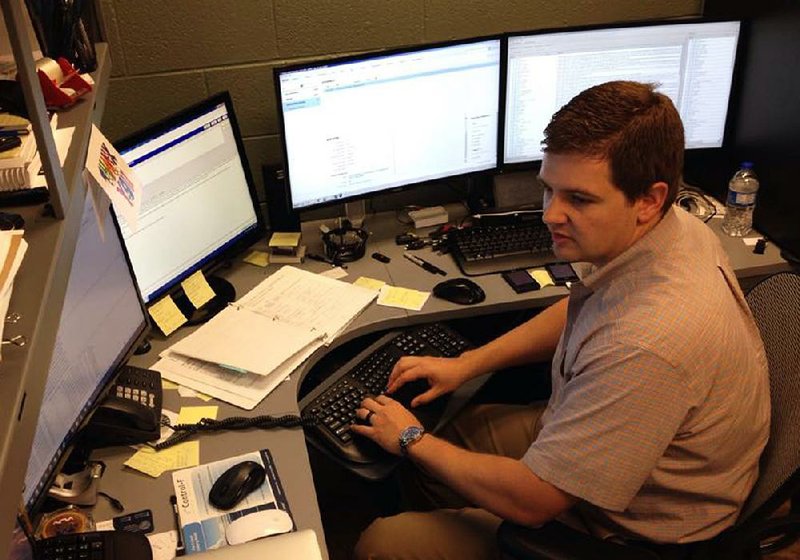JONESBORO -- Jonesboro police detective Brandon King sits at a bank of five computers each day and searches for people peddling child pornography.
Using a peer-to-peer program, King's computer can request certain photographs and videos from other computers and then log the Internet provider addresses of those sending the images to begin building a case against offenders. The program recognizes more than 3.5 million images that have been deemed to be unlawful.
King set the program to search overnight Monday, and within three hours he received several hundred hits from users across the state.
"It's how we build a case," King said. "We hit him and 'ping' his computer when we get a download."
The Jonesboro Police Department is one of 44 agencies in the Arkansas Internet Crimes Against Children network and the only one in northeast Arkansas. The network is overseen by the Arkansas State Police and provides training and forensic assistance for law enforcement agencies.
Six years ago, Gov. Mike Beebe announced that Jonesboro's department would receive a $113,114 American Recovery and Reinvestment Act grant to create an Internet laboratory. Beebe said then that in 2009, more than 60 percent of evidence examined at the state's two investigative labs in Little Rock came from northeast Arkansas. He credited the work of Jonesboro detectives Ernest Ward and Gary Shackleford for the amount of evidence collected, and he cited the need for the new lab.
Since then, Jonesboro's department has investigated Internet crimes across the area, conducting its own investigations in Craighead County and assisting neighboring jurisdictions.
The department averages eight to 12 arrests a year, King said.
"It takes a long time to process the cases," he said. "We usually have 10 to 12 cases in the works at all times."
Earlier this year, King and other detectives arrested a Jonesboro children's pastor for possession of child pornography. The pastor had thousands of images in his computer. It was one of the largest child pornography cases King has worked, the detective said.
"Jonesboro does a lot of heavy lifting," said Capt. Steven Coppinger, commander of the state police's Internet Crimes Against Children section. "They do their own cases and help facilitate other agencies. They are also available to train others, too."
King and other detectives used to work nights, posing as youngsters in Internet chat rooms to lure predators into initiating meetings with them.
The Marion County sheriff's office, although not a member of the state's Internet Crimes Against Children network, had an aggressive program at one time that used chat rooms. The program "slowed down" when the sheriff's office didn't have the personnel to work it, a Marion County sheriff's office spokesman said.
Van Buren County still uses chat rooms, along with the peer-to-peer computer software, said Sgt. Daniel Perry.
"It's always going on," he said. "We stay busy. Day and night, people are downloading pornography."
The job is taxing emotionally, King said. In order to build a case against a potential offender, the detective must look at the images.
"We see a constant flow of horrible content," King said. "I have to watch the videos. This is the only realm of law enforcement where you commit a felony to prosecute someone."
King has a 6-year-old son and a daughter who will be born in August.
"This makes it hard to trust anyone," he said. "We've arrested people with no criminal history. They are likable people but they are doing that.
"My wife reminds me that the whole world is not evil. The only thing that keeps me going is that we are getting guys who are now looking at pictures. Five years from now, they may be [assaulting] some kid. There is a huge satisfaction in knowing that.
"We want pedophiles to know that it's a matter of time before we kick his door open."
Child pornography usage has not necessarily increased, Coppinger said. Instead, access is much easier.
"Before, people had to go to a bookstore or international vendor," he said. "Now, the Internet helps facilitate nefarious activities."
The peer-to-peer system also helps pornographers. It's harder to detect who sends objectionable images, King said. The system creates a network of users who can exchange files with one another without going through a centralized server.
In some cases, bits of images are sent by several computers at once to compile a complete picture.
When King leaves for the evening, he runs a peer-to-peer program that seeks out photographs that have been "pinged" as objectionable.
On Tuesday, he ran through a list of computer users whose computers attempted to send the requested photographs.
Many came from Little Rock, Fort Smith, Jonesboro and Fayetteville -- four of Arkansas' five largest cities. But the list also contained hits from Horseshoe Bend, Ash Flat, Nashville and other smaller towns.
"It doesn't matter if it's a big city," said Faulkner County sheriff's investigator Chad Meli, who works on the county's Internet Crimes Against Children program. "It's anywhere."
Meli's team has made 18 child pornography arrests since January by using chat rooms, peer-to-peer computer use and responding to "suspicious" advertisements on online sites such as Craigslist.
Some downloads were not completed, the program indicated. But several requests were granted, meaning that each one who sent the photo committed a felony, King said.
The detective expects child pornography cases to increase because of advanced technology. Smartphones that allow users Internet access anywhere, camera telephones, online games and other new technology are making it easier for offenders to find images.
"Every child wants a cellphone," King said. "We, as parents, are enabling our kids [to become victims] by allowing them cellphones. You cannot let them have Internet access that you can't monitor.
"We are the most advanced society, but we are regressing because of it."
State Desk on 07/17/2016

